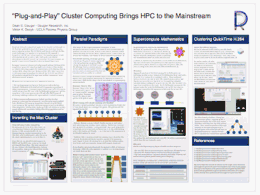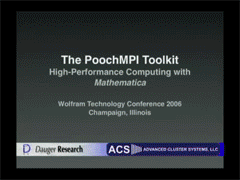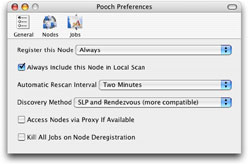|
What's New
News and Events about Pooch
|
|
|
|
 New Pooch v1.8.3 Ships New Pooch v1.8.3 Ships
Dauger Research ships version 1.8.3 of the
Pooch family of clustering software today. Several updates to Pooch
for OS X 10.7 "Lion" include:
- Pooch revised to disable use of deprecated components such as Network Services Library
- Conversion of the Pooch Installer and Pooch Package to Universal Binary
- Conversion of other Unix-level components to PowerPC and Intel fat binary
- Other minor fixes
See the Pooch Manual for further details.
Pooch users can renew their subscriptions today!
|

|
 New Pooch v1.8.2 Ships Today New Pooch v1.8.2 Ships Today
Dauger Research ships version 1.8.2 of the
Pooch family of clustering software today. Several updates to Pooch include:
- Support for and corrections when using UTF-8 characters in the Job Window, Node Info window, and Network Scan window so that non-Roman characters show in computer and file names and other entities on these windows
- Corrected an Open MPI installation issue
- Updated methods on Mac OS X to acquire local IP addresses
- Other minor updates and fixes
The Pooch Manual has further details.
Current Pooch users can renew their subscriptions today!
|
|
 Pooch at Supercomputing 2010
Pooch at Supercomputing 2010
 New Pooch v1.8.1 Ships Today New Pooch v1.8.1 Ships Today
Anticipating WWDC 2010, Dauger Research ships version 1.8.1 of the
Pooch family of clustering software today. Changes include:
- Updated Open MPI support for Snow Leopard, 64-bit, and G5s
- Extended support for computer names composed of non-Roman characters, such as Japanese
- Bundled with a new version of the
Pooch QuickTime Exporter with added compatibility with iMovie '08 and '09
- Updated methods to acquire local IP addresses
- Other minor updates and fixes
See the Pooch Manual for further details.
Current Pooch users can renew their subscriptions today!
|

|
|
 Pooch v1.8 Released Pooch v1.8 Released
Pooch Clusters Snow Leopard and 64-bit Linux
At Supercomputing 2009, Dauger Research announces version 1.8 of the
Pooch
family of clustering software. This patented easy-to-use clustering
technology, merging a modern graphical user interface with
supercomputer-compatible parallel computing, debuts support of both Mac
OS X 10.6 "Snow Leopard" and 64-bit Linux compute nodes.
|
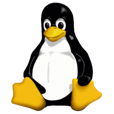 
|
Significant changes include:
- Linux: Pooch can now cluster nodes running 64-bit Linux, combined with Mac
- 64-bit: Major internal revisions for 64-bit, particularly updated data types and
structures, for Mac OS X 10.6 "Snow Leopard" and 64-bit Linux
- Sockets: Major revisions to internal networking to adapt to BSD Sockets, as
recommended by Apple moving forward and required for Linux
- POSIX Paths: Major revisions to internal file specification format in favor of POSIX
paths, recommended by Apple moving forward and required for Linux
- mDNS: Adapted usage of Bonjour service discovery to use Apple's Open Source
mDNS library
- Pooch Binary directory: Added Pooch binary directory support, making possible
launching jobs using a remotely-compiled executable
- Minor updates and fixes needed for Mac OS X 10.6 "Snow Leopard"
|
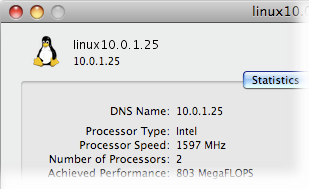
|
Current Pooch users can renew their subscriptions today!
Click to read more.....
 Pooch at Supercomputing 2009
Applying the easy-to-use, patented Pooch clustering technology,
the Supercomputing Engine for Mathematica enables Wolfram Research's
Mathematica to be combined with the programming paradigm of today's
supercomputers. Our patent-pending approach takes advantage of
Mathematica's Kernel-Front End infrastructure to parallelize it without
its code being "aware" it is running in parallel. This adaptation of
Mathematica to parallel computing closely follows the industry-standard
Message-Passing Interface (MPI), as in modern supercomputers.
As every Supercomputing attendee knows, that behavior is necessary to
address the largest problems in scientific computing.
Pooch at Supercomputing 2009
Applying the easy-to-use, patented Pooch clustering technology,
the Supercomputing Engine for Mathematica enables Wolfram Research's
Mathematica to be combined with the programming paradigm of today's
supercomputers. Our patent-pending approach takes advantage of
Mathematica's Kernel-Front End infrastructure to parallelize it without
its code being "aware" it is running in parallel. This adaptation of
Mathematica to parallel computing closely follows the industry-standard
Message-Passing Interface (MPI), as in modern supercomputers.
As every Supercomputing attendee knows, that behavior is necessary to
address the largest problems in scientific computing.
Please see
Advanced Cluster Systems' booth 2295,
on the northwest end
of the exhibit hall near the Wolfram Research booth, starting Tuesday, where we
can answer questions about this solution. If you are
attending SC09 or are in the Portland area, please come by to say hello.
 Pooch at Supercomputing 2008
We apply the
programming paradigm of today's supercomputers
and the easy-to-use Pooch clustering technology
to Wolfram Research's Mathematica. In contrast to typical
master-slave "grid"s, this solution instead closely follows MPI, from
inside the Mathematica environment, and has every kernel in the cluster
communicate with each other directly and collectively.
As every Supercomputing attendee knows, that behavior is necessary to
address the largest problems in scientific computing.
Pooch at Supercomputing 2008
We apply the
programming paradigm of today's supercomputers
and the easy-to-use Pooch clustering technology
to Wolfram Research's Mathematica. In contrast to typical
master-slave "grid"s, this solution instead closely follows MPI, from
inside the Mathematica environment, and has every kernel in the cluster
communicate with each other directly and collectively.
As every Supercomputing attendee knows, that behavior is necessary to
address the largest problems in scientific computing.
 Ten Years of Mac Clustering
Ten Years of Mac Clustering

|
Dauger Research Presents at WWDC 2008
On Wednesday, June 11, 2007, 6:30 pm, Dauger Research will be presenting at the
WWDC 2008 Scientific Development Poster Session,
in the Howard St. corridor on the 2nd floor of Moscone West,
on 'Ten Years of "Plug-and-Play" Cluster Computing'.
Dauger Research,
Inc.,
celebrates ten years of "plug-and-play" cluster computing at
Apple's WWDC.
In 1998, a time when the Bondi-blue iMac was new,
two UCLA
physicists invented the Mac cluster. As a side project, they
"reinvented" the cluster computer to better advance their scientific
research. Today, reincarnated as the
patented Pooch (Parallel OperatiOn
and Control Heuristic application) and Pooch Pro clustering software,
the technology combines cutting edge supercomputing components like Open
MPI and leverages the famed ease-of-use of the Macintosh, producing a
solution so easy to use that
children have built clusters using it.
|
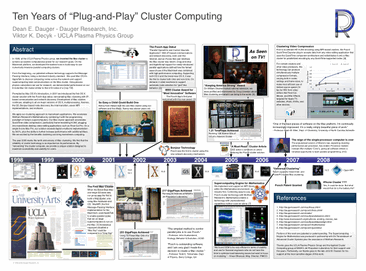
|
"After clustering Macs for ten years, ours is still the simplest way to
get into clustering", said Dr. Dean Dauger, President of Dauger
Research, Inc. "For a decade, we produce reliable, accessible, 'ad hoc',
powerful Mac clusters that continue to inspire others in academia,
research, and industry. When we built the first Mac cluster ten years
ago, we knew we had something great, and it was clear others could
benefit. 2008 is a great time to look back and see what sprung from the
seed we planted. We thank all the wonderful people who helped us with
this vision."
All attendees or others in the San Francisco area, please come by Wednesday evening and say hello.
A complete copy of the poster is available.
An earlier oppotunity to meet is at the
SF Mac Indie Event on Sunday evening at 5 pm.
Pooch 1.7.6 - Open MPI, Leopard, and Java Support
Version 1.7.6 of Pooch and Pooch Pro ships with Open MPI and Leopard support.
The new Pooch now supports seven MPI implementations, combining supercomputing technologies
with the ease-of-use of the Macintosh.
|
This version's new features include:
Mac OS 10.5 "Leopard" prompts updates in a variety of Pooch techologies:
- Network Scan window
- Preferences window
- Keychain access
- Launching via, detection of, and commands to the Terminal
- Behind the Login window behavior
- Other user interface and infrastructure adjustments
Open MPI support
- Complete MPI support using libraries built into Leopard
- Automatically installs Open MPI modules for Pooch
|


|
|
MPJ Express support
- Launches MPI-style Java code
- Support .jar and .class execution types
|
MPI.Init(args);
int me = MPI.COMM_WORLD.Rank();
int size = MPI.COMM_WORLD.Size();
System.out.println("Hi from <"+me+">");
MPI.Finalize();
|
|
|
Long file, application, and directory name support
AppleScript access to user-defined nodelists and remote network data
Other features, optimizations, bug fixes, and updates
Ships with new version 1.3 of the Pooch QuickTime Exporter
|
|
|
More in the press release while
full details are in the updated Pooch Manual.
 Pooch in the Supercomputing Engine for Mathematica at Supercomputing 2007
Pooch in the Supercomputing Engine for Mathematica at Supercomputing 2007
 Pooch in Digital Production BuZZ Interview
Pooch in Digital Production BuZZ Interview
 Conferencia Latinamericana de Computatición de Alto Rendimiento
Conferencia Latinamericana de Computatición de Alto Rendimiento
 Pooch Goes to Hollywood
Pooch Goes to Hollywood
|
Motion Graphics Los Angeles Group
On Wednesday, July 11, 2007, 7 pm to 10 pm, Pooch was presented at the
MGLA July meeting,
at the Gallery Theatre at
Barnsdall Art Park in Hollywood,
on a newly released version
of our technology for clustering QuickTime video encoding.
We follow Apple's presentation of their new Motion 3.
Motion Graphics Los Angeles (MGLA) provides a way for
professionals creating imagery for
video, film, and other media using desktop tools to meet every month.
They usually meet in Hollywood, a center of such activity.
Our easy-to-use numerically-intensive clustering computing solution,
"reinvents" the cluster computer,
but we need your help!
Please sign the Petition to encourage Apple to parallelize their
code and work with Pooch!
|
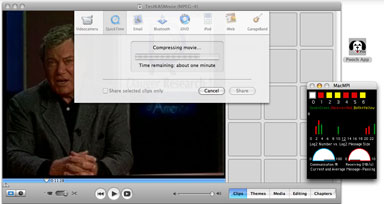
|
 WWDC 2007 Scientific Poster Presentation
WWDC 2007 Scientific Poster Presentation
All attendees or others in the San Francisco area, please come by Tuesday evening and say hello.
A complete copy of the poster is viewable.
An earlier oppotunity to meet is at the
SF Mac Indie Event on Sunday evening at 5 pm.
 New QuickTime Video Compression Clustering Technology Released
New QuickTime Video Compression Clustering Technology Released
|
First Official Release of the Pooch QuickTime Exporter
Dauger Research releases version 1.0 of a
QuickTime Exporter plug-in that automatically parallelizes
video compression from video-editing applications like iMovie, Final Cut Express, and Final Cut Pro.
It uses Pooch technology to apply high-performance computing to desktop video editing.
The new version supports compressing several movies at once for multi-format
video podcasting and compression
bracketing, a more robust fault recovery system, H.264 and AAC support, and
a renovated user interface.
|

|
 Video Presentation of the PoochMPI Toolkit for Mathematica
Video Presentation of the PoochMPI Toolkit for Mathematica
 North Carolina A&T Professor Presents at Supercomputing 2006
North Carolina A&T Professor Presents at Supercomputing 2006
 Presenting the PoochMPI Toolkit for Mathematica at Wolfram Conference
Presenting the PoochMPI Toolkit for Mathematica at Wolfram Conference
|
Pooch Technology at Wolfram Research's Technology Conference
At the Wolfram Technology Conference 2006 in Champaign, Illinois,
Advanced Cluster Systems and Dauger Research
jointly present the
PoochMPI Toolkit for Mathematica.
By truly running Wolfram Research's Mathematica in parallel, its power can be combined with
Pooch clustering technology's ease of use and
reliability in high-performance computing.
WTC 2006 Attendees: See the latest on supercomputer-style Mathematica at:
- The Advanced Cluster Systems booth the Grand Foyer
- The presentation
at 2 pm on Thursday in White Oaks II
|
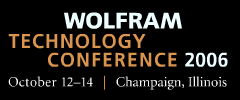
|
 PoochMPI Toolkit for Mathematica Announced
PoochMPI Toolkit for Mathematica Announced
|
Wolfram Research's Mathematica Parallelized using Pooch
At WWDC 2006 in San Francisco,
the PoochMPI Toolkit for Mathematica is announced, which enables
Wolfram Research's Mathematica to be combined with the easy-to-use, supercomputer-compatible
Pooch clustering technology of Dauger Research.
By truly running Mathematica in parallel, its power can be combined with Pooch' ease of use
and reliability in high-performance computing.
This new technology, as Pooch as done before, will further enhance the power of clusters for
its users.
WWDC Attendees: See a demo in the Science Connection
on Thursday at 9-10 am.
|
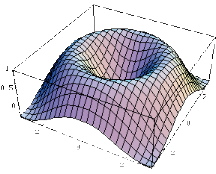
|
 QuickTime Compression Clustered with Pooch Preview
QuickTime Compression Clustered with Pooch Preview
|
Pooch QuickTime Exporter Plug-In Previewed
Dauger Research previews a
QuickTime Exporter plug-in that automatically parallelizes
video compression from video-editing applications like iMovie and Final Cut Pro.
It uses Pooch technology to apply high-performance computing to desktop video editing.
WWDC Attendees: See a demo in the Science Connection
on Thursday at 9-10 am.
|
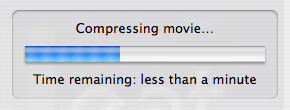
|
 DR Presents Pooch at WWDC 2006
DR Presents Pooch at WWDC 2006
|
See these WWDC events
| Poster Session: |
Wednesday at 7:00 pm | 2nd. floor, Howard st. corridor |
| Demonstration: | Thursday at 9:00 am | Science Connection |
At WWDC 2006 in San Francisco, Dauger Research
presents a
poster
describing how Pooch helps in modeling multiparticle quantum systems.
Also a demonstration
of the Pooch clustering solution
will be held at
the Science Connection
and how it benefits scientific users and developers on the platform.
|

|
| Also available for download:
| 
a PDF
| and |

a podcast |
regarding the poster. |
Pooch 1.7 - First to Support Universal Clustering
Version 1.7 of Pooch and Pooch Pro ships today as a Universal Application!
The new Pooch becomes the first and only clustering solution to launch Universal Applications in parallel.
|
This version's new features include:
Universal Binary for running on mixed clusters of Intel- and PowerPC-Macs
- manages both types of nodes, making all cluster data available
- launches Universal binaries, enabling cross-processor clustering; Pooch is
the first and only clustering solution to launch Universal Binaries in parallel
|

|
|
|
Remote job, file, and folder retrieval support, even through proxy nodes
|
New Job file format support, including saving and loading job data
- save commonly used jobs, file and node combinations, to disk
- supports standard file dialog and reminder sheets
|
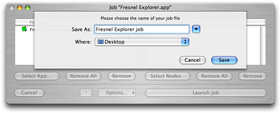
|
Head node setting to access and control clusters with Linux-style topologies
- accesses nodes behind a head node acting as a firewall and NAT router
- coordinates Pooch features to launch jobs via the head node
|

|
|
|
Enhancements to the AppleEvent interface for job and user data
Automatic detection and retry of preferred IP address of remote nodes
Pooch Pro automatic user login using Keychain services
Other features, enhancements, bug fixes, and updates
Two new dashboard widgets for scanning nodes and scanning jobs on the cluster
Other feature enhancements, bug fixes, and adaptations to changes in OS X
|


|
|
More in the press release while
full details are in the updated Pooch Manual.
|
Pooch 1.6.5 Released
Version 1.6.5 of Pooch and Pooch Pro ship today
delivering a series of enhancements, behavioral changes, fixes, and
adaptations to ongoing changes in the platform.
This version's new features include:
Enhancements to the command-line interface
New support in Pooch Pro for AppleScript access to user data and login state
New support in Pooch Pro for import and export of user data via text files
|
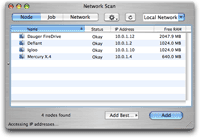
|
|
|
Updates to utilization of technologies specific to Mac OS X 10.4 "Tiger":
- Automator - Three new Pooch actions for Automator workflows
- Dashboard - View cluster status and activity in an aesthetic environment
- Spotlight - Updated search plug-in for finding job data
Other feature enhancements, bug fixes, and adaptations to changes in OS X
More in the press release while
full details in the updated Pooch Manual.
|
|
|
 Pooch in Interview on Frank Peters' Podcast
Pooch in Interview on Frank Peters' Podcast
"Interviewing the Titans of Industry", the Frank Peters Show
produces a podcast spotlighting entrenpeneurs and innovative technologies.
Frank Peters' latest interview discusses
Pooch clustering technology and
observations about the computing industry, including
both high-performance and personal computing.
Subscribe to their podcast via their web site
or via iTunes.
 DR Speaks about Pooch at WWDC 2005
DR Speaks about Pooch at WWDC 2005
|
Apple Invites Pooch Demo at WWDC 2005
--> Don't miss this session! - Tuesday at 3:30 in The Mission <--
At WWDC 2005 in San Francisco, Apple
invites Dauger Research to
speak at
Session 606: "Mac OS X and Scientific Computing"
and demonstrate how
the Pooch clustering solution inspires scientific users and developers
to excel on the platform.
Motivated by the success of Pooch demos at WWDC 2004 and in Apple's Seminar Series on HPC,
this session is hosted by Apple's Senior VP of Software Engineering, Dr. Bud Tribble.
|
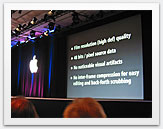
|
Pooch 1.6 Taps Tiger, Grid, and Web
|
Version 1.6 of Pooch and Pooch Pro are shipping.
This version leverages new features of OS X "Tiger", introduces new support for distributed/grid-style computing,
user-defined node lists a la iTunes "playlists".
All this with a renovated Network Scan window and extended AppleScript support.
|

|
|
Major new features include:
- Utilization of new technologies in Mac OS X 10.4 "Tiger":
- Automator - Incorporate Pooch actions into workflows
- Dashboard - View cluster status and activity in an aesthetic environment
- Spotlight - Locate data in Pooch jobs via the system
- Xgrid - Pooch makes Xgrid nodes accessible to users
|
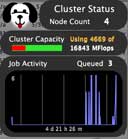
|
|
- Adaptations to other adjustments specific to "Tiger"
- Major updates to the Network Scan window.
including support for user-defined node lists in their own movable Network pane, a multi-purpose action pop-up menu, an address box, an all-new Network view mode, and even a Search mechanism
- Extended AppleScript fidelity, exposing additional node, network, and job data
| 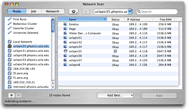
|
- Support for a new web-based interface
- Other feature enhancements, bug fixes, and adaptations to changes in OS X
|
|
Read more in the press release.
Full details are in the new Pooch Manual.
 Pooch Spotlighted on National Television
Pooch Spotlighted on National Television
Pooch Spotlighted on "Keeping America Strong", Hosted by William Shatner
A special focus on Pooch, the only easy-to-use yet
supercomputer-compatible cluster computing solution,
was broadcast while interviewing Dauger Research, Inc., on "Keeping America Strong".
This episode part of a special television
broadcast hosted by William Shatner. This production is one of a "Heartbeat of
America" TV series focusing on innovative small businesses performing
breakthrough work. The program features interviews by Doug Llewelyn, well-known
as "The People's Court" reporter, of the team running Dauger Research, with a live Pooch demonstration.
Doug Llewelyn interviews
Dr. Dauger and Kevin Sinclair, VP Operations, while they perform a live
demonstration of clustering with Pooch.
The program airs nationwide on Tuesday, May 2, 2005, at 9 AM EST on the AmericanLife Television Network.
You may also view the program online.
 Pooch Presented at ICCS 2005
Pooch Presented at ICCS 2005
Pooch Presented at International Conference on Computational Science 2005
In Atlanta, GA, Emory University hosts the 2005 International Conference on Computational Science
aiming to bring together scientists of all disciplines
to discuss problems and solutions for research utilizing
computation.
Glad to be part of the program, Dauger Research is
speaking in a workshop on
"Plug-and-Play" Cluster Computing:
HPC Designed for the Mainstream Scientist
at 3:40 pm on Monday, May 23.
If you are in the area, please attend.
Full details are available on
ICCS web site.
CiSE Cluster Issue Publishes Article featuring Pooch
Computing in Science and Engineering, a joint publication of IEEE and the
American Institute of Physics, just published a special issue (March/April 2005)
focused on Cluster Computing.
Available here with permission, one of its five cluster articles is about Mac clusters:
 "Plug-and-Play" Cluster Computing: High-Performance Computing for the Mainstream
"Plug-and-Play" Cluster Computing: High-Performance Computing for the Mainstream
"This article is a must-read for anyone who wants to apply clustering
... but faces limited resources for actually managing the cluster."
- Prof. George K. Thiruvathukal in the Guest Editor's Introduction
|
Pooch Featured in Week 7 of Apple Seminar Series on HPC
Apple invited Dauger Research to present as part of the Apple Seminar Series,
presenting the Pooch Application and code optimization
techniques for high-performance computing.
This series, "Apple and High Performance Computing",
inspired by the success at Dauger Research's presentation at WWDC 2004, continues.
The schedule is:
If you're in the area, please attend!
Ask your local Apple representative about a seminar near you.
New Parallel Code Tutorial Pages on the Pooch web site:
Pooch Featured in Continuing Apple Seminar Series on HPC
Apple invited Dauger Research to present as part of the Apple Seminar Series,
presenting the Pooch Application and code optimization
techniques for high-performance computing.
This series, "Apple and High Performance Computing",
inspired by the success at Dauger Research's presentation at WWDC 2004, continues.
The schedule is:
If you're in the area, please attend!
Ask your local Apple representative about a seminar near you.
Pooch Pro harnesses 128 Dual-Processor Xserve G5s!
Pooch Pro launched the AltiVec Fractal benchmark on the Dawson Cluster and achieved 1.21 TeraFlop!
This result sets a new milestone for plug and play clustering.
January 2005
Pooch Featured in Apple Seminar Series on HPC
Apple invited Dauger Research to give a seminar series on High-Performance Computing.
The success of Dauger Research's paricipation at the WWDC presentation on HPC (see below)
inspired this new Apple Seminar Series on HPC.
The focus the seminar was on Pooch and code optimization techniques.
Full demonstrations and parallel computing tutorials were provided. The schedule thus far:
Ask your local Apple representative about scheduling a seminar near you. We are booking new seminars for 2005.
Click to read a PDF about the seminar...
A
QuickTime stream archive of the presentation
at the University of Texas at Dallas is available for your viewing pleasure!
December 2004
Pooch 1.5.5 Supports LAM/MPI and mpich-gm
|
Version 1.5.5 of Pooch, the Parallel OperatiOn and Control Heuristic application
is shipping.
This version introduces new technologies to access and run clusters behind
firewalls.
And it introduces support for using high-speed Myrinet hardware
and the open-source LAM/MPI implementation.
|
Major new features include:
- Support for jobs using LAM/MPI on local TCP/IP-based networks
|
- Support for mpich-gm, enabling Pooch to launch jobs on clusters connected using
Myricom's Myrinet hardware
|
|
- Forwarding a job via another node, such as a "head node", to submit jobs to nodes behind a firewall
|
- Automatic output retrieval system, detecting and returning new and modified files once the job that wrote them is finished
|
|
- Better optimized and more reliable proxy address access
- Limiting access to a node from a specific set of IP addresses
- Choosing a preferred primary address if there are multiple
- Other minor feature enhancements and bug fixes
|
|
Read more in the press release.
Full details are in the new Pooch Manual.
September 2004
|
Pooch Pro Debuts
At Apple's WWDC 2004, Dauger Research unveils Pooch Pro while releasing version 1.5 of Pooch,
the Parallel OperatiOn and Control Heuristic application.
Pooch Pro is an enhanced version of Pooch
that adds supercomputer-level resource management capabilities to Mac clusters.
It provides the ability to administrate a cluster for users organized into groups and regulates their
usage of the cluster via a quota system.
This compute time quotas combine job length limits and rollover minutes with a group-user heirarchy,
providing an unmatched and unprecedented level cluster management
with a modern, drag-and-drop, graphical user interface.
|
|

|
|
|
|
Don't miss this session!
Meanwhile, Apple has invited Dr. Dauger of Dauger Research, Inc., to speak in their High-Performance Computing track at
Session 642: "HPC Software Optimization in Depth" on Thursday, July 1, at 2 pm in Nob Hill.
Dr. Dauger is introducing how to write MPI parallel code and how to set up and use
a Mac cluster.
|
|
|

|
|
|
|
Stop by the exhibit!
Not only that, Dauger Research is manning an exhibitor's booth at WWDC 2004. Please come by and say hello!
This promises to be a busy time for Dauger Research, Inc.
|
|
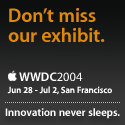
|
|
Major new features introduced with Pooch Pro include:
- User, group, and administrative account system, including secure password log in
- Quota and time limit-based management of cluster resources, including rollover
minutes
- User database management with Unix-style user and group organization
- A new modern, graphically-based user administration interface
- User associated job tracking and job history database
- Other minor feature enhancements and bug fixes
|
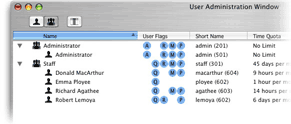
|
Customers whose subscriptions are active prior to the release of Pooch Pro are
automatically upgraded to the Pooch Pro level, which includes Pooch. They will have
the opportunity to renew at the Pooch or Pooch Pro level at their next normal renewal date.
Their updates are shipping.
Read more in the press release.
Full details are in the new Pooch Manual.
June-July 2004
|
Pooch Updated To 1.4.5
|
Version 1.4.5 of Pooch, the Parallel OperatiOn and Control Heuristic application
is shipping.
This version introduces technologies to access and run clusters behind
firewalls. It also updates its graphically-based, dynamic job queue and
scheduling system and main menu system taking advantage of Mac OS X Panther.
|
|
|
|
|
Major new features include:
Read more in the press release.
Full details are in the new Pooch Manual.
May 2004
Pooch's Alabama Tour
Dr. Dean Dauger was invited to give a series of talks in the Huntsville, Alabama, area.
All was welcome to come and hear about the latest in
easy-to-use, plug-and-play cluster computing.
Demonstrations were provided.
University of Alabama, Huntsville: April 8 at 2:30 pm in the
UAH Optics Building, Room OB-234.
Click for abstract
NASA's National Space Science and Technology Center: April 9 at 10:30 am in NSSTC Conference Room 2096, 320 Sparkman Drive.
Click for abstract
The Huntsville Macintosh Users Group:
April 10 at St. Stevens Episcopal Church at 10 am. Click for more info
April 2004
Updated Pages on the Pooch web site:
Pooch in Print
In ComputorEdge, they published an article under their
"Mac Madness" column named "Mac SuperComputers and SuperComputer Macs".
See pages 30-32 of their February 27, 2004, issue.
Parlez-vous français?
Check out the article named "Dans La Famille Clusters..." in the Février 2004 issue of
svmMac
magazine. You'll find a familiar screenshot of Pooch v1.4 on page 128.
(Printed with permission, of course.)
March 2004
New Content and Updated Pages on the Pooch web site, including:
February 2004
· January 7: A presentation at
NASA's Marshall Space Flight Center on the new Pooch v1.4.
Pooch Adds New Brains and Beauty
|
Version 1.4 of Pooch, the Parallel OperatiOn and Control Heuristic application
is shipping.
This version introduces a new graphically-based, dynamic job queue and scheduling system
taking advantage of Pooch's built-in heuristic functions and cluster diagnostics.
It also sports an updated graphical user interface taking advantage of features
introduced in Panther, Apple's latest Mac OS X.
|
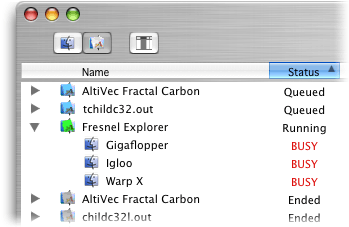
|
Major new features include:
- A new queuing and scheduling system for retaining jobs until specific conditions
are met integrated with:
- A new job tracking system designed to track the progress and execution of jobs
and retain historical data about terminated jobs
|
|
- An enhanced and updated graphical user interface that includes the new
"brushed metal" look available in OS X 10.3 and later.
|
|
- The Node Scan Window is now the Network Scan Window, divided into a Node
View and a new Job View mode to scan the entire network for queued, launching,
running, terminated, and aborted jobs and display statistics about these jobs
|
|
- An updated Node Info Window displaying additional data and utilizing tabbed
viewing and consistency with the OS X user-interface guidelines
|
|
- New drawers for the Job Window: the Recent Items drawer displays and recalls
recently used files and nodes, and nodes of the remote node scan cache, and the
Options drawer accesses all options of the job
|

|
- An "Automatically Acquire Nodes" feature so jobs can automatically acquire
nodes given a minimum number of nodes or processors to acquire starting at any
specified node
- An updated, antialiased Start Time dialog for the Job Window
- A new Pooch Preferences window, accessible from the Pooch menu, featuring
toolbar-style access to preferences in Pooch, categorized into General, Nodes, and Jobs preference panes.
- Other enhancements to preferences, including manipulating logout settings
|
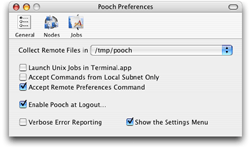
|
- New installation choices, triggered by the option key, in the Pooch Installer
- A variety of minor bug fixes
Read more in the press release.
Full details are in the new Pooch Manual.
Other web site updates include:
January 2004
Pooch at SuperComputing 2003
|
Dauger Research, Inc., demonstrated and discussed Pooch at the
Apple Booth of SuperComputing 2003 in Phoenix, Arizona.
Apple Computer invited Dauger Research to join them at the conference and
graciously let our team borrow a Power Mac G5 and several Xserves on the show floor.
Installation, of course, was quick and painless.
We tied these in with machines at UCLA Physics, almost 400 miles away, over the Internet.
|
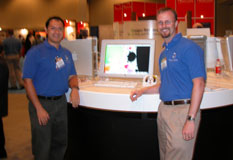
|
Manning the booth were Dr. Dean Dauger (left) and
Kevin Sinclair (right).
We appreciated all the attendees who stopped by; we especially appreciated their enthusiasm after they
were introduced to Pooch.
Updated content on the
Pooch web site:
November 2003
New content and structure has been added to the
Pooch web site:
October 2003
The Pooch web site has been completely restructured, with new content added.
New changes and material include:
July 2003
Pooch Extends Use of Unutilized Computational Power and Command-Line Interface
Version 1.3.5 of Pooch, the Parallel OperatiOn and Control Heuristic application
is shipping.
This version debuts
new features designed to take advantage of the untapped power of a Mac computer lab or other
administered environment. It also extends its command-line support with a new suite of command-line
tools and the ability to install Pooch via a command line, capabilites designed for the
Compute Node XServe. Major new features include:
- The ability to launch jobs on nodes that are logged out. The executables run while the
OS X login window is displayed. Off-hours Macs in computer labs or on desktops can now be easily
reused as computing clusters without interfering with day work.
- Support for a new suite of command-line utilities,
including querying for cluster status and submitting
jobs into a command-line based queuing system
- Supports installation via a command line for "headless" machines
- Numerous other user-interface and performance improvements and minor bug fixes
Read more in the press release.
Full details are in the Pooch Manual.
Pooch can now be ordered via the
Dauger Research Online Store.
June 2003
|
At the invitation of Apple Computer, Dr. Dean Dauger of Dauger Research presented
the Parallel OperatiOn and Control Application Application and
easy-to-use cluster computing at FOSE 2003,
the information technology expo for the government marketplace held in Washington, D. C., on April 8-10.
Also, the Dauger Research station was manned for the duration of the show.
|
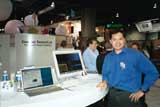
click to enlarge
|
If you look carefully in the image, you can see the AltiVec Fractal code running in
parallel on the Cinema Display. It was running in parallel on a PowerBook G4 17" and two dual-processor XServes in a nearby
rack in Washington, D. C., plus four dual-processor Power Mac G4s at the UCLA Physics Department
in Hershey Hall back in Los Angeles, California. At the moment the picture was taken,
the results from the local machines just completed, while the results from the UCLA machines
were just about to arrive. This cross-continent cluster was regularly achieving upwards of 30 Gigaflops
for the passers-by.
View the full sized presentation here.
April 2003
Apple introduced the Compute Node edition of the
XServe.
Now available at the Apple Store, a "Compute Node"
configuration of the XServe is available for build-to-order
purchase. Featuring two G4 processors each running at 1.33GHz, Mac OS X Server, and
Gigabit Ethernet, this unit is an ideal building block for your computing cluster,
especially given the demonstrated performance of XServe clusters.
March 2003
Pooch is running on a 33-node XServe cluster at
NASA's Jet Propulsion Laboratory.
Using Pooch, the
AltiVec Fractal Carbon demo
was able to utilize this cluster to
achieve
217 billion
floating-point operations per second! This is the largest calculation
yet performed on an XServe cluster.
The Applied Cluster Computing Group (formerly known as
the High-Performance Computing Group)
at JPL has begun using Pooch to launch parallel code on their new
XServe cluster.
At present, it is the largest working XServe cluster known to exist.
· Dr. Dean Dauger will be available at the Apple booth of the
SuperComputing 2002 conference to
discuss this result and other topics.
November 2002
· Version 1.3 of Pooch has been released.
Major new features include:
- Support for launching multiple tasks per computer, including automatically
launching multiple tasks on multiprocessing Power Macs. This feature
makes it possible for parallel applications to use one API to mix
parallel computing both within a box and between boxes
- Uses OS X 10.2's new
Rendezvous
(a. k. a.
ZeroConf) implementation
in addition to Service Location Protocol (SLP) simultaneously for discovery of other nodes
- Introduces Pooch Lite, a minimal-UI version of Pooch suitable for
broad installation on administered machines, such as in a student lab
- Numerous other improvements and minor bug fixes
See
the Pooch Manual for details.
· New parallel applications,
the Fresnel Diffraction Explorer and pMrBayes, are introduced on
the Pooch Download page.
October 2002
· September 24-26: Presented at the
Apple exihibitor booth at
the IEEE Cluster Computing 2002 conference.
September 2002
· Version 1.2.1 of Pooch, containing a
few minor bug fixes and cosmetic improvements, has been released. See
the Pooch Manual for details.
An update to plaunch was also made.
· Check out page 22 of the June 2002 issue of
MacWorld!
Their macbeat article entitled "Strength in Numbers"
highlights
the 233-GFlop achievement made using 76 Power Macs at USC
and what it means for parallel computing and the Macintosh platform.
June 2002
Apple introduced the new
XServe, which
has great implications for Mac clustering.
May 2002
· April 23: A presentation at
the Aerospace Corporation.
The list of latest new users of Pooch include people at
the Argonne National Laboratory and
the MGM Las Vegas hotels.
See the Users page for more.
Version 1.2 of Pooch has been released. Major new features include:
- Support for jobs compiled with other MPIs, such as mpich and MPI-Pro
- Support for Cocoa apps and other bundle-based applications
- Complete support for Unix-based executables, including Mach-O executables and Unix scripts
- Complete support for Unix-style permissions, process monitoring, and process killing
- Node registration scheduling now possible
- Lists of recently selected nodes and files can be recalled
Please see the documentation
for details.
April 2002
Pooch's Canadian Tour
Dr. Dean Dauger was invited to give presentations at a series of seven educational institutions
from February 26 through March 21
at the invitation of
Apple Canada:
|
Dr. Dauger was very proud to present at these
notable educational institutions.
Live demonstrations of parallel computing were made, including linking
machines in Canada with those back at UCLA, and every demonstration
was successful. (Even
the snow couldn't hold them back.)
Each presentation generated a great deal of discussion and
excitement about the present and future of the technology.
You may also view
video of the presentation.
|

|
March 2002
· January 29:
A Wired News article
that generated a lot of interest, even on
Slashdot.
· January 23: A presentation at
USC's Department of Aeronautical and Astonautical Engineering.
· January 15: A presentation at
Arizona State University.
During Christmas break 2001, Pooch was tested on a 76-node cluster formed out of
Power Macs in
USC's Laungauge Arts computer lab.
It successfully and reliably launched 76-node jobs in this environment,
proving the scalability of Pooch and, by launching the
AltiVec Fractal Carbon demo,
achieved
233 billion
floating-point operations per second!
January 2002
· November 29: A presentation at
MIT's Whitehead Institute for Biomedical Research.
· November 28: A presentation at
Harvard Medical School.
· November 27: A presentation at
the Apple Boston Market Center.
· November 13, 14, & 15: Presentations at the
Supercomputing 2001 Conference in Denver, Colorado.
November 2001
· October 30: A presentation at
EDUCAUSE 2001 Conference in Indianapolis, Indiana.
· October 19: A presentation at
USC.
On October 10, 2001,
IEEE Cluster 2001
awarded their
"Best Commercial Exhibit - Software" prize to
the "most innovative commercial software product",
version 1.1 of Pooch!
| This award is significant because all the major players in cluster
computing was at this conference, yet
a committee of an IEEE conference looked beyond the Linux solutions and pointed to
a Macintosh clustering product as the "most innovative".
|
|
· At this coference, Dr. Dean Dauger and Dr. Viktor Decyk
presented
a paper entitled
Numerically-Intensive "Plug-and-Play" Parallel Computing.
New in version 1.1 of Pooch
|
Pooch is now scriptable!
You may now create customized and automated queuing and launching mechanisms
for parallel computing jobs using AppleScript (see
Sample AppleScripts).
Because AppleScripts can be written and run from X's Unix command line, you may
now direct Pooch from a command line interface (see
plaunch). In addition, other applications can ask
Pooch to query the network and submit parallel jobs, allowing automated parallel
launching, a feature of the "Computational Grid", from a Mac application. See the
AltiVec Fractal Carbon demo
for an example.
Numerous other features and improvements to Pooch are detailed in
the Pooch Manual.
|
October 2001
· September 10: A presentation at
IEEE Conference in Poland by Dr. Viktor Decyk.
· September 7: A presentation at
ISSS-6 Meeting at the
Max-Planck-Institüt für Extraterrestrische Physik in Garching (outside München), Germany.
September 2001
· August 7 & 9:
Presentations by Dr. Viktor Decyk and Dr. Dean Dauger at
Apple's SummerCamp 2001
at
Sheridan College
in Toronto, Canada.
August 2001
· April 26:
Presentation by Dr. Dean Dauger at
Harvey Mudd College's
Computer Science department in Claremont, California.
· April 17:
First release of Parallel OperatiOn and Control Heuristic Application.
April 2001
|
 Pooch at Supercomputing 2010
Pooch at Supercomputing 2010
 Pooch at Supercomputing 2009
Pooch at Supercomputing 2009
 Pooch at Supercomputing 2008
Pooch at Supercomputing 2008
 Ten Years of Mac Clustering
Ten Years of Mac Clustering

 Pooch in the Supercomputing Engine for Mathematica at Supercomputing 2007
Pooch in the Supercomputing Engine for Mathematica at Supercomputing 2007
 Pooch in Digital Production BuZZ Interview
Pooch in Digital Production BuZZ Interview
 Conferencia Latinamericana de Computatición de Alto Rendimiento
Conferencia Latinamericana de Computatición de Alto Rendimiento
 New QuickTime Video Compression Clustering Technology Released
New QuickTime Video Compression Clustering Technology Released
 North Carolina A&T Professor Presents at Supercomputing 2006
North Carolina A&T Professor Presents at Supercomputing 2006


 New Pooch v1.8.3 Ships
New Pooch v1.8.3 Ships

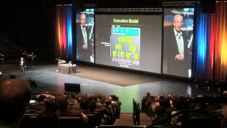

 Pooch v1.8 Released
Pooch v1.8 Released







